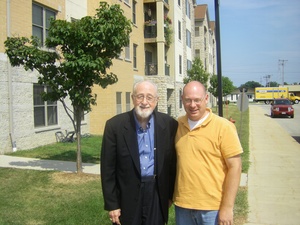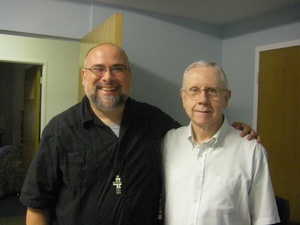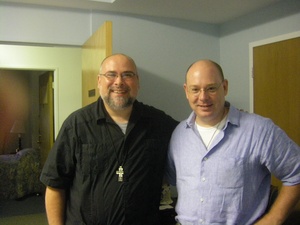August 2010 Archives
 The UK Bishops' Conference will be providing the Holy Father --and the Church universal-- this sanctuary for the Sacrifice of the Mass and the Rite of Beatification for Cardinal Newman. The the only possible thing to say is: OMG!!!! What rubbish.
The UK Bishops' Conference will be providing the Holy Father --and the Church universal-- this sanctuary for the Sacrifice of the Mass and the Rite of Beatification for Cardinal Newman. The the only possible thing to say is: OMG!!!! What rubbish.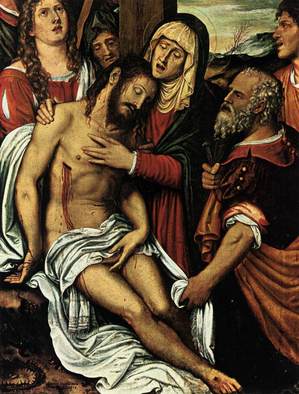 O God, by whose grace Saint Joseph of Arimathea was emboldened to ask for the sacred Body of our Lord Jesus Christ, that together with Saint Nicodemus he might prepare it for burial and lay it in his own tomb, give us such an increase of faith and courage that we may not fear to bear reproach for the sake of Christ,but rather may serve Him with sincere devotion all the days of our life.
O God, by whose grace Saint Joseph of Arimathea was emboldened to ask for the sacred Body of our Lord Jesus Christ, that together with Saint Nicodemus he might prepare it for burial and lay it in his own tomb, give us such an increase of faith and courage that we may not fear to bear reproach for the sake of Christ,but rather may serve Him with sincere devotion all the days of our life.
Today, the Roman Martyrology, the Church gives us Saints Joseph of Arimathea and Nicodemus as models of holiness, pointing with certainty, to Christ Himself. But you may ask if is correct since one rarely sees, if ever, these saints on the liturgical calendar and never preached in the sacred Liturgy, even when proclaimed in the Gospel. The Martyrology says:
At Jerusalem, the commemoration of Saints Joseph of Arimathea and Nicodemus, who received the body of Jesus taken down from the cross, wrapped it in a shroud and placed it in the sepulchre. Joseph, a noble official and disciple of the Lord, was seeking the Kingdom of God; Nicodemus, for his part, a member of the Pharisees and a ruler among the Jews, came to Jesus by night to inquire of his mission and defended him in the presence of the high priests and Pharisees who sought to arrest him.
 Dad celebrates his 70th birthday today!
Dad celebrates his 70th birthday today!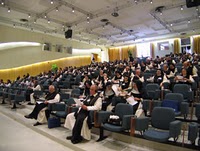 Prayers are requested for the members of the General Chapters of the Cistercian monks and the Dominican Friars who begin their meetings today in Rome. In the coming days both Chapters will deal the Order's business and hold an election for new leadership: the Cistercians will elect a new Father General and the Dominicans a Master General.
Prayers are requested for the members of the General Chapters of the Cistercian monks and the Dominican Friars who begin their meetings today in Rome. In the coming days both Chapters will deal the Order's business and hold an election for new leadership: the Cistercians will elect a new Father General and the Dominicans a Master General.
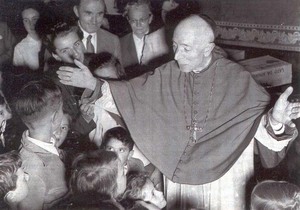 Almighty God, through Your grace, Blessed Alfredo Ildefonso, by his exemplary virtue built up the flock entrusted to him. Grant that we, under the guidance of the Gospel, may follow his teaching and walk in sureness of life, until we come to see You face to face in Your eternal kingdom.
Almighty God, through Your grace, Blessed Alfredo Ildefonso, by his exemplary virtue built up the flock entrusted to him. Grant that we, under the guidance of the Gospel, may follow his teaching and walk in sureness of life, until we come to see You face to face in Your eternal kingdom.
Alfredo Ludovico Luigi Schuster was born in Rome of Bavarian immigrants on January 18, 1880. At 11 years old he entered the Benedictine Abbey of Saint Paul outside the Walls taking the name Ildefonso in 1896; he professed solemn vows in 1902. Philosophy studies was done at Sant'Anselmo and theology was studied at Saint Paul's where he was ordained a priest on March 19, 1904.
Service to the monastic way of life, besides the daily opus Dei (the praying of the Divine Office), included scholarship, novice master for 8 years, prior of the for 2 years, procurator of the Cassinese Congregation of the Benedictine monks for 12 years and abbot-ordinary of Saint Paul outside the Walls from 1918 until 1929. He was President of the Pontifical Oriental Institute from 1919 to 1922.
On June 26, 1929, Pope Pius XI nominated him the Archbishop of Milan and a few weeks later created him a cardinal on July 15. In 1933, the Order of Malta honored Schuster with the Grand Cross for his service to the Church.
Cardinal Schuster died of natural causes on August 30, 1954. In 1957, Cardinal Giovanni Montini --later Pope Paul VI-- introduced Schuster's cause for canonization. It is said that upon opening Schuster tomb on January 28, 1985, his was incorrrupt; he beatied on May 12, 1996 by Pope John Paul II.
Days before Blessed Ildefonso died he said: "You want something to remember be by. All I can leave you is an invitation to holiness...."
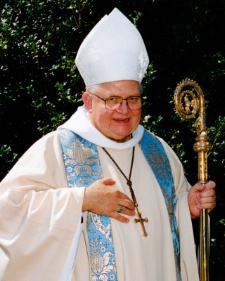 A week ago today the monastic community of St Mary's Abbey (Morristown, NJ), indeed the Church, lost a faithful monk, priest, abbot and friend. Abbot Thomas Confroy made his final passover to the Lord, his Destiny at the abbey on August 23. News of Abbot Thomas' death can be read here.
A week ago today the monastic community of St Mary's Abbey (Morristown, NJ), indeed the Church, lost a faithful monk, priest, abbot and friend. Abbot Thomas Confroy made his final passover to the Lord, his Destiny at the abbey on August 23. News of Abbot Thomas' death can be read here.- Sundays: St Mary's Abbey, especially those in most need of strength;
- Mondays: those in religious life;
- Tuesdays: the faithful departed and the poor souls in purgatory;
- Wednesdays: his natural family and special requests made to him;
- Thursdays: the pope, cardinals, bishops, suffering priests, deacons, pastoral ministers, seminarians and vocations to the priesthood;
- Fridays: for missionaries
- Saturdays: for himself, for forgiveness if any of his actions harmed others spiritually or emotionally.
The gives to us today in the Office of Readings the following from the Confessions of Saint Augustine of Hippo, whose feast we celebrate today. These are some of the most moving words of the great Augustine! If you have not read the Confessions I urge you to do so; I have always felt thus, so much so that when I taught high school junior theology I had my students read significant sections of the work.
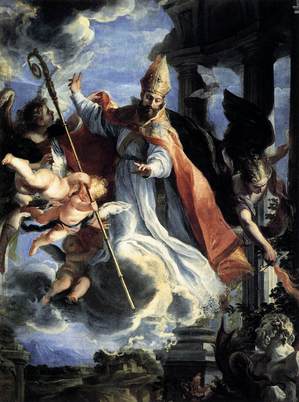
Urged to reflect upon myself, I entered under your guidance the innermost places of my being; but only because you had become my helper was I able to do so. I entered, then, and with the vision of my spirit, such as it was, I saw the incommutable light far above my spiritual ken and transcending my mind: not this common light which every carnal eye can see, nor any light of the same order; but greater, as though this common light were shining much more powerfully, far more brightly, and so extensively as to fill the universe. The light I saw was not the common light at all, but something different, utterly different, from all those things. Nor was it higher than my mind in the sense that oil floats on water or the sky is above the earth; it was exalted because this very light made me, and I was below it because by it I was made. Anyone who knows truth knows this light.
O eternal Truth, true Love, and beloved Eternity, you are my God, and for you I sigh day and night. As I first began to know you, you lifted me up and showed me that, while that which I might see exists indeed, I was not yet capable of seeing it. Your rays beamed intensely on me, beating back my feeble gaze, and I trembled with love and dread. I knew myself to be far away from you in a region of unlikeness, and I seemed to hear your voice from on high: "I am the food of the mature: grow, then, and you shall eat me. You will not change me into yourself like bodily food; but you will be changed into me".
Accordingly I looked for a way to gain the strength I needed
to enjoy you, but I did not find it until I embraced the mediator between God
and man, the man Christ Jesus, who is also God, supreme over all things and
blessed for ever. He called out, proclaiming I am the Way and Truth and the
Life, nor had I known him as the food which, though I was not yet strong enough
to eat it, he had mingled with our flesh, for the Word became flesh so that
your Wisdom, through whom you created all things, might become for us the milk
adapted to our infancy.+Late have I loved you, O Beauty ever ancient, ever new,
late have I loved you! You were within me, but I was outside, and it was there
that I searched for you. In my unloveliness I plunged into the lovely things
which you created. You were with me, but I was not with you. Created things
kept me from you; yet if they had not been in you they would not have been at
all. You called, you shouted, and you broke through my deafness. You flashed,
you shone, and you dispelled my blindness. You breathed your fragrance on me; I
drew in breath and now I pant for you. I have tasted you, now I hunger and
thirst for more. You touched me, and I burned for your peace.
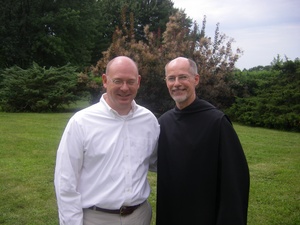
Remembering Saint Monica, mother of the great Saint Augustine of Hippo today, I re-read the account Augustine gave of his mother's death and his tribute to her in the Confessions (9.12). The intimacy Augustine portrays between he and God and he and his mother is beautiful and very striking. Truly, grace at work.
![St Monica Andrea Verrocchio[1].jpg](http://communio.stblogs.org/assets_c/2010/08/ St Monica Andrea Verrocchio[1]-thumb-285x343-7110.jpg)
Augustine writes of his mother:
I closed her eyes; and there flowed in a great sadness on my heart and it was passing into tears, when at the strong behest of my mind my eyes sucked back the fountain dry, and sorrow was in me like a convulsion. As soon as she breathed her last, the boy Adeodatus burst out wailing; but he was checked by us all, and became quiet. Likewise, my own childish feeling which was, through the youthful voice of my heart, seeking escape in tears, was held back and silenced. For we did not consider it fitting to celebrate that death with tearful wails and groanings. This is the way those who die unhappy or are altogether dead are usually mourned. But she neither died unhappy nor did she altogether die. For of this we were assured by the witness of her good life, her "faith unfeigned," and other manifest evidence.
What was it, then, that hurt me so grievously in my heart except the newly made wound, caused from having the sweet and dear habit of living together with her suddenly broken? I was full of joy because of her testimony in her last illness, when she praised my dutiful attention and called me kind, and recalled with great affection of love that she had never heard any harsh or reproachful sound from my mouth against her. But yet, O my God who made us, how can that honor I paid her be compared with her service to me? I was then left destitute of a great comfort in her, and my soul was stricken; and that life was torn apart, as it were, which had been made but one out of hers and mine together.
When the boy was restrained from weeping, Evodius took up the Psalter and began to sing, with the whole household responding, the psalm, "I will sing of mercy and judgment unto thee, O Lord." And when they heard what we were doing, many of the brethren and religious women came together. And while those whose office it was to prepare for the funeral went about their task according to custom, I discoursed in another part of the house, with those who thought I should not be left alone, on what was appropriate to the occasion. By this balm of truth, I softened the anguish known to thee. They were unconscious of it and listened intently and thought me free of any sense of sorrow. But in thy ears, where none of them heard, I reproached myself for the mildness of my feelings, and restrained the flow of my grief which bowed a little to my will. The paroxysm returned again, and I knew what I repressed in my heart, even though it did not make me burst forth into tears or even change my countenance; and I was greatly annoyed that these human things had such power over me, which in the due order and destiny of our natural condition must of necessity happen. And so with a new sorrow I sorrowed for my sorrow and was wasted with a twofold sadness.
So, when the body was carried forth, we both went and returned without tears. For neither in those prayers which we poured forth to thee, when the sacrifice of our redemption was offered up to thee for her -- with the body placed by the side of the grave as the custom is there, before it is lowered down into it -- neither in those prayers did I weep. But I was most grievously sad in secret all the day, and with a troubled mind entreated thee, as I could, to heal my sorrow; but thou didst not. I now believe that thou wast fixing in my memory, by this one lesson, the power of the bonds of all habit, even on a mind which now no longer feeds upon deception. It then occurred to me that it would be a good thing to go and bathe, for I had heard that the word for bath [balneum] took its name from the Greek balaneion, because it washes anxiety from the mind. Now see, this also I confess to thy mercy, "O Father of the fatherless": I bathed and felt the same as I had done before. For the bitterness of my grief was not sweated from my heart.
Then I slept, and when I awoke I found my grief not a little assuaged. And as I lay there on my bed, those true verses of Ambrose came to my mind, for thou art truly,
"Deus, creator omnium,
Polique rector, vestiens
Diem decoro lumine,
Noctem sopora gratia;
Artus solutos ut quies
Reddat laboris usui
Mentesque fessas allevet,
Luctusque solvat anxios."
"O God, Creator of us all,
Guiding the orbs celestial,
Clothing the day with lovely light,
Appointing gracious sleep by night:
Thy grace our wearied limbs restore
To strengthened labor, as before,
And ease the grief of tired minds
From that deep torment which it finds."
And then, little by little, there came back to me my former memories of thy handmaid: her devout life toward thee, her holy tenderness and attentiveness toward us, which had suddenly been taken away from me -- and it was a solace for me to weep in thy sight, for her and for myself, about her and about myself. Thus I set free the tears which before I repressed, that they might flow at will, spreading them out as a pillow beneath my heart. And it rested on them, for thy ears were near me -- not those of a man, who would have made a scornful comment about my weeping. But now in writing I confess it to thee, O Lord! Read it who will, and comment how he will, and if he finds me to have sinned in weeping for my mother for part of an hour -- that mother who was for a while dead to my eyes, who had for many years wept for me that I might live in thy eyes -- let him not laugh at me; but if he be a man of generous love, let him weep for my sins against thee, the Father of all the brethren of thy Christ.
 There are a few good opportunities to take our lives seriously. One such opportunity is the Crossroads Cultural Center that looks "to offer opportunities for education, making it possible to look with openness, curiosity and critical judgment at every aspect of reality." Crossroads takes Saint Paul's exhortation to "test everything; retain what is good" with
There are a few good opportunities to take our lives seriously. One such opportunity is the Crossroads Cultural Center that looks "to offer opportunities for education, making it possible to look with openness, curiosity and critical judgment at every aspect of reality." Crossroads takes Saint Paul's exhortation to "test everything; retain what is good" with 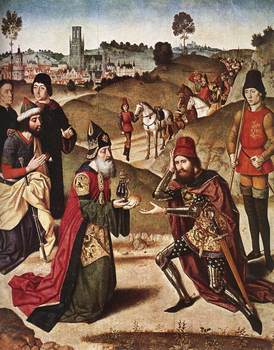
The Roman Martyrology lists one of the saints for today as Melchizedek, the righteous King of Salem who offered bread and wine to God in worship. Melchizedek means the King of Justice or King of Peace; "Salem" is the root word for Jerusalem. Melchizedek is also remembered in the Roman Canon of the Mass when the priest prays, "...according to the order of Melchizedek." The Church's commemoration of this mysterious King of Salem reminds us that Melchizedek is a bridge between the Old and New Testaments; he is the first priest of the Old Testament mentioned in sacred Scripture and St. John Chrysostom even speaks of the King as "the perfect image of the Savior," that is, he's an Old Testament type, a foreshadowing of Jesus Christ as priest and king.
In a homily Bishop Photius of Lyons in part says of Melchizedek:
St. John Chrysostom says: "Melchizedek was righteous and the faithful image of Christ. Moved by a prophetic spirit, he discerned the oblation which must one day be offered for the Gentiles, and, in the example of the future Christ, he offered bread and wine as sacrifice to God. But, the Judaic synagogue, which honored God according to the order of Aaron, offered Him a sacrifice, not of bread and wine, but of bulls and lambs and glorified the Lord by bloody sacrifices. That is why God, addressing Himself to the One Who was to be born of the Virgin Mary, Jesus Christ, His Son, says to Him, `You are Priest forever according to the order of Melchizedek' and not according to the order of Aaron, who honors his God while offering Him bulls and heifers" (Op. cit., p.482-483). St. Ambrose draws the conclusion that the Christian worship is more ancient than that of the Law since it is Melchizedek, the image of Christ, who brings the bread and the wine, not Abraham (Cf "Dictionnaire de Spiritualite", col. 971. St. Ambrose, "De Sacramentis", IV, 8, 10-11; "De Mysteriis", 8, 44-45).
That the figure of
Melchizedek is fulfilled in the Lord Jesus Christ, the Fathers all hold to the
fact that He alone is truly `without genealogy': "The Son of God,"
says St. John Chrysostom, "is without father and without mother; without father
as to His earthly genesis; without mother as to His heavenly genesis"
("Homelie sur Melchizedek", op. cit., p.479. Cf. also
"Expication des Psaumes", Ps. CIX, ibid., p.332). If then the
Scriptures say of Melchizedek that he was `without genealogy', it is not at all
that in reality he did not have parents, "because", says St. John
Chrysostom, "we maintain that Melchizedek is not only a man like us . .
. but as Melchizedek was the type of Christ, Whose image he bore, in the
same way was Jonas. The Scriptures had not spoken of his father, so that
he might offer us a perfect image of the Saviour Who alone, in truth, has
neither father nor genealogy" (Ibid., p.482). Likewise, in his
homily on the Psalm of David, he says: "That which Melchizedek was in figure,
Jesus Christ was in reality, and the name of Melchizedek was like the names of
Jesus and of Christ, which long in advance announced and prefigured the mission
of the Saviour. When we read that Melchizedek had neither beginning nor
end of his life, it is not that in reality he had had neither beginning nor
end, but because no trace is found of his genealogy. Jesus, on the
contrary, had in truth no beginning of His days, nor end of His life. His
existence had no time, no beginning, no end. One was the figure, the other
the truth" (Id.,"Oeuvres Completes", t.IX, p.332).
Blessed John Henry Newman was enchanted by the mysteriousness of the priest and king Melchizedek who composed a poem, "Melchizedek":
Without father, without mother, without descent; having neither beginning of days, nor end of life.
Thrice bless'd are they, who fell their lonliness;
To whom nor voice of friends nor pleasant scene
Brings that on which the sadden'd heart can lean;
Yea, the rich earth, garb'd in her daintiest dress
Of light and joy, doth but the more oppress,
Claiming responsive smiles and rapture high;
Till, sick at heart, beyond the veil they fly,
Seeking His Presence, who alone can bless.
Such, in strange days, the weapons of Heaven's grace;
When, passing o'er the high-born Hebrew line,
He forms the vessel of His vast design;
Fatherless, homeless, reft of age and place,
Sever'd from earth, and careless of its wreck,
Born through long woe His rare Melchizedek.
Nicholson & Lee, eds. The Oxford Book of English Mystical Verse, 1917.
The reading at Lauds this morning was from Sirach 8. You'll recall that the Book of Sirach is also called the Liber Ecclesiasticus (that is, the "church book") because of its wide use in catechetics and in the sacred Liturgy. There is nothing in Sirach that is not applicable to us today! Monks, nuns, priests and laity who do the Office of Readings will read the entire book in the course of 2-3 weeks. As a point of comparison, Sirach is one of those books that Protestants do not include in their version of the Bible; Catholics consider Sirach to be both inspired and canonical and worthy of prayer and meditation.
In general one may say that the author Sirach is concerned with interfacing of all parts of our lives: family, friendship, economy, politics, worship, good public order, etc. The Catholic term here would be communio, while the Protestants are inclined to use the concept of fellowship, but to be fair at today's writing, Catholics use the word "fellowship" in the Liturgy and that is mistaken. For the Catholic, communio is not merely the horizontal relationship with sisters and brothers --mere humanitarianism-- but first communion (relationship) with the Blessed Trinity and then communion with sister and brother. Communion with the Trinity and with neighbor leads to one's greater freedom (think of Msgr Giussani's work in Communion & Liberation movement). To take this idea one step further, there is no hard separation between communion with the Trinity and neighbor. Catholics hold fast to the both/and of reality: we are to live in communion with the Trinity, basing our life analogously on the inner life of the Trinity and serving our sister and brother. Saint Benedict in his Rule shows us this is the way to God. What struck me today was the question: To whom do we go for counsel? How do I live in a more perfect freedom with the Trinity and my neighbor? In what ways do I serve the Lord well? How have I looked with tenderness on my humanity, and that of others?
Certainly, I have not always been served well by the advice offered by those placed over me. Superiors, whether secular or religious, have not always been too attuned to the Divine Will through prayer, fasting and lectio that their own issues have been the source of counsel rather than the Will of God; I am amazed that I've survived as well as I have. In profound ways, I have to say, the people I was told to have confidence in turned out be frauds when it came to working with one's humanity, discernment of Spirits, the spiritual life, interpersonal relationships, ecclesial politics, etc. After praying on what Sirach has to say today, I wonder if we as members of the Body of Christ have paid too little attention to the Wisdom literature of the Bible.
Jesus, son of Eleazar, son of Sirach writes:
Contend not with an influential man, lest you fall into his power. Quarrel not with a rich man, lest he pay out the price of your downfall; For gold has dazzled many, and perverts the character of princes. Dispute not with a man of railing speech, heap no wood upon his fire. Be not too familiar with an unruly man, lest he speak ill of your forebears. Shame not a repentant sinner; remember, we all are guilty. Insult no man when he is old, for some of us, too, will grow old. Rejoice not when a man dies; remember, we are all to die. Spurn not the discourse of the wise, but acquaint yourself with their proverbs; From them you will acquire the training to serve in the presence of princes. Reject not the tradition of old men which they have learned from their fathers; From it you will obtain the knowledge how to answer in time of need. Kindle not the coals of a sinner, lest you be consumed in his flaming fire. Let not the impious man intimidate you; it will set him in ambush against you. Lend not to one more powerful than yourself; and whatever you lend, count it as lost. Go not surety beyond your means; think any pledge a debt you must pay. Contend not at law with a judge, for he will settle it according to his whim. Travel not with a ruthless man, lest he weigh you down with calamity; For he will go his own way straight, and through his folly you will perish with him. Provoke no quarrel with a quick-tempered man, nor ride with him through the desert, For bloodshed is nothing to him; when there is no one to help you, he will destroy you. Take no counsel with a fool, for he can keep nothing to himself. Before a stranger do nothing that should be kept secret, for you know not what it will engender. Open your heart to no man, and banish not your happiness (Sirach 8).
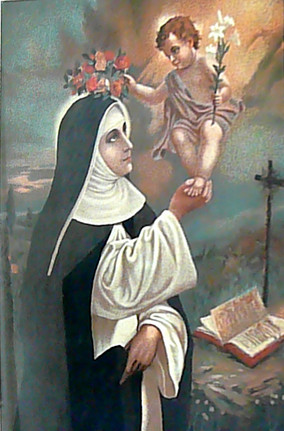 Come, bride of Christ, and receive the crown, which the Lord has prepared for you for ever.
Come, bride of Christ, and receive the crown, which the Lord has prepared for you for ever.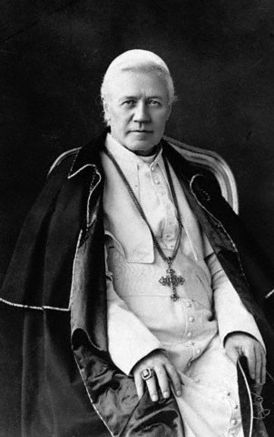
In Pope Saint Pius X we have an ardent supporter and leader in devotion to the Christ Lord known to us in the adoration of the Blessed Sacrament. Today, take the opportunity to spend some time, even if it is 5 minutes, in front of the Blessed Sacrament saying nothing to the Lord; just being there in friendship and humble adoration is enough. And ask Saint Pius X to beg the Holy Spirit once again to place in our hearts a fervent love for the Lord in the Eucharist and the grace to live in communio with the Trinity and our neighbor.
Saint Pius wrote of the place Eucharistic worship in our Catholic lives:
Wherefore, works of this kind which have been already set on foot must be ever more zealously promoted; old undertakings must be revived wherever perchance they may have fallen into decay; for instance, Confraternities of the holy Eucharist, intercessory prayers before the blessed Sacrament exposed for the veneration of the faithful, solemn processions, devout visits to God's tabernacle, and other holy and salutary practices of some kind; nothing must be omitted which a prudent piety may suggest as suitable. But the chief aim of our efforts must be that the frequent reception of the Eucharist may be everywhere revived among Catholic peoples. For this is the lesson which is taught us by the example, already referred to, of the primitive Church, by the decrees of Councils, by the authority of the Fathers and of the holy men in all ages. For the soul, like the body, needs frequent nourishment; and the holy Eucharist provides that food which is best adapted to the support of its life. Accordingly all hostile prejudices, those vain fears to which so many yield, and their specious excuses from abstaining from the Eucharist, must be resolutely put aside; for there is question here of a gift than which none other can be more serviceable to the faithful people, either for the redeeming of time from the tyranny of anxious cares concerning perishable things, or for the renewal of the Christian spirit and perseverance therein. To this end the exhortations and example of all those who occupy a prominent position will powerfully contribute, but most especially the resourceful and diligent zeal of the clergy.
Pope Saint Pius X, Mirae Caritatis (1902)
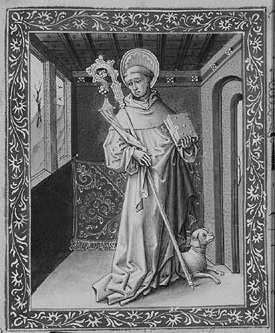
'What shall I render unto the Lord for all His benefits towards me?' (Ps. 116:12). Reason and natural justice alike move me to give up myself wholly to loving Him to whom I owe all that I have and am. But faith shows me that I should love Him far more than I love myself, as I come to realize that He hath given me not my own life only, but even Himself. Yet, before the time of full revelation had come, before the Word was made flesh, died on the Cross, came forth from the grave, and returned to His Father; before God had shown us how much He loved us by all this plenitude of grace, the commandment had been uttered, 'Thou shalt love the Lord thy God with all thine heart, and with all thy soul and with all thy might' (Deut. 6:5), that is, with all thy being, all thy knowledge, all thy powers. And it was not unjust for God to claim this from His own work and gifts. Why should not the creature love his Creator, who gave him the power to love? Why should he not love Him with all his being, since it is by His gift alone that he can do anything that is good? It was God's creative grace that out of nothingness raised us to the dignity of manhood; and from this appears our duty to love Him, and the justice of His claim to that love. But how infinitely is the benefit increased when we bethink ourselves of His fulfillment of the promise, 'thou, Lord, shalt save both man and beast: how excellent is Thy mercy, O Lord!' (Ps. 36:6f). For we, who 'turned our glory into the similitude of a calf that eateth hay' (Ps. 106:20), by our evil deeds debased ourselves so that we might be compared unto the beasts that perish. I owe all that I am to Him who made me: but how can I pay my debt to Him who redeemed me, and in such wondrous wise? Creation was not so vast a work as redemption; for it is written of man and of all things that were made, 'He spake the word, and they were made' (Ps. 148:5). But to redeem that creation which sprang into being at His word, how much He spake, what wonders He wrought, what hardships He endured, what shames He suffered! Therefore what reward shall I give unto the Lord for all the benefits which He hath done unto me? In the first creation He gave me myself; but in His new creation He gave me Himself, and by that gift restored to me the self that I had lost. Created first and then restored, I owe Him myself twice over in return for myself. But what have I to offer Him for the gift of Himself? Could I multiply myself a thousand-fold and then give Him all, what would that be in comparison with God?
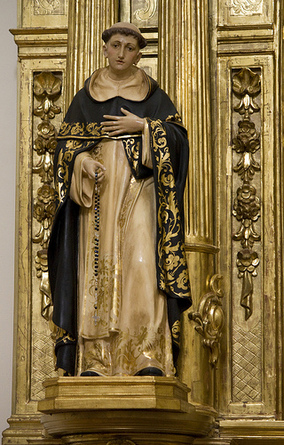 Priests of God, bless the Lord; praise God, all you that are holy and humble of heart.
Priests of God, bless the Lord; praise God, all you that are holy and humble of heart.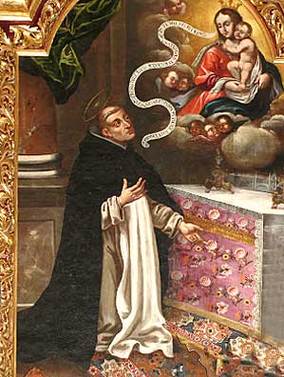 Proclaim the glory of the Lord among the nations, God's marvelous deeds to all the peoples; great is the Lord and worthy of all praise.
Proclaim the glory of the Lord among the nations, God's marvelous deeds to all the peoples; great is the Lord and worthy of all praise.Christianity holds forth a surprising happiness and promise of joy. It describes and offers a mystery of life that is full and forever. The magnificent Feast of the Assumption of the Blessed Virgin Mary celebrated on August 15 proclaims the deepest and most profound of these Christian mysteries and promises. Virgin Mary-- the Bearer of God who was the first and best disciple of her Son-- lived a long life in the presence of God. She experienced a resurrection after falling asleep in death (called Dormition) and a transport to Heaven (called Metestiseen, Assumption). Remarkably, this is the joy that lies in wait for all other disciples of the Lord Jesus Christ whose bodies will rise at the end of time and be with God in Heaven forever.
Let us examine the details of the Assumption of Our Blessed Virgin Mary in the tradition and legend of the event of her falling asleep and transport to Heaven as found in the icon and liturgy of the ancient Church. At the beginning, understanding that God entered into the human realm to stamp out death and bring life without end to humanity, we see this believing young Hebrew mother as the first person since Adam and Eve to experience realization of God's full life ... herself receiving life without end both physically and spiritually in unity with God the Creator, a glory forever and ever.At the end of time, all those judged to be living in the presence of God, who is Life Eternal, will also receive this remarkable eternal gift.
The spiritual powers receive her with honors due to God, and she who is truly the mother of Life departs unto life, the lamp of Light which no man can approach, the salvation of the faithful and the hope of our souls. (The Feast of Dormition, Great Vespers, Lete, Tone 2*).
Cry out, O David, and tell us, what is this present feast about which you sang in the book of Psalms? And David says, "Christ has carried up into the heavenly mansions her who bore Him without seed. I sang of her in the Psalms calling her 'daughter, bride of God and virgin'. Therefore, mothers, daughters and brides of Christ, rejoice and call out, "Hail to you, O Lady, who have been translated to the Kingdom on high." (Orthros [Morning Prayer], Sessional Hymns after the First Reading from thePsalter, Tone 4*).
Wherefore, O most pure Mother of God, forever alive with your Son, the Source of Life, do not cease to intercede with Him that He may guard and save your people from every trouble, for you are our intercessor. (Vespers, Tone 8 before the Entrance*).
Father Stephen Bonian, S.J.
A Maronite Jesuit priest serving the Eparchy of Our Lady of Lebanon
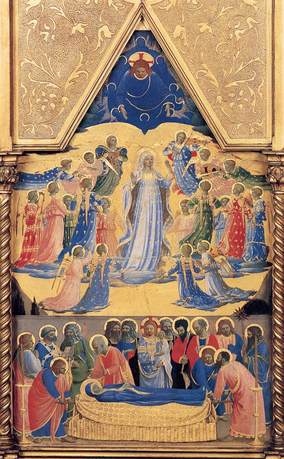
Song For Our Lady's Assumption
As the tower of David art thou, O Mary,
And in thee there is no flaw,
How beautiful and lovely art thou in the adorning,
And the odor of thy ointments
Is like the fragarance of Libanus,
Above all perfume.....
Like a dove brooding over swelling waters,
Like vials that pour out perfumed oil,
Like lilies distilling their fragarance,
Like the golden vessels of Tharsis,
Like the choice Libanus and the cedar tree,
Like fair tall columns of marble
Set upon bases of gold, art thou, O Mary!
How beautiful and how lovely!
(The Mozarabic Liturgy, Robert, Cyril. Mary Immaculate: God's Mother and Mine. Poughkeepsie, NY: Marist
Press, 1946.)
With First Vespers for the Solemnity of the Assumption of the Blessed Virgin Mary in view --it is now the beginning of the vesperal light and the Church gathers to pray her evening prayers-- thoughts turn to salvation in Christ and the meaning of Mary for us. She is the indeed the hope and comfort of the serious and pilgrim Christian. The great Mother of God shows us that the promises of God are true, reasonable and worthy of hope in this world and for life in the next. It is from her that we know the Second Person of the Trinity, it is her 'yes' to the Will of God that the great lie told of and to all humanity disappears.The Father of the Second Vatican Council point us in a direction:
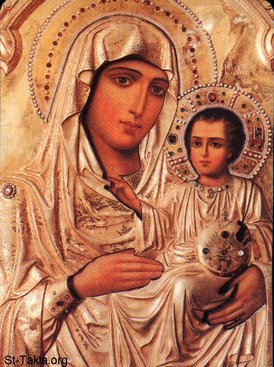 "In the interim just as the Mother of Jesus, glorified in body and soul in heaven, is the image and beginning of the Church as it is to be perfected is the world to come, so too does she shine forth on earth, until the day of the Lord shall come,as a sign of sure hope and solace to the people of God during its sojourn on earth.
"In the interim just as the Mother of Jesus, glorified in body and soul in heaven, is the image and beginning of the Church as it is to be perfected is the world to come, so too does she shine forth on earth, until the day of the Lord shall come,as a sign of sure hope and solace to the people of God during its sojourn on earth.
"It gives great joy and comfort to this holy and general Synod [Vatican II] that even among the separated brethren there are some who give due honor to the Mother of our Lord and Saviour, especially among the Orientals, who with devout mind and fervent impulse give honor to the Mother of God, ever virgin. The entire body of the faithful pours forth instant supplications to the Mother of God and Mother of men that she, who aided the beginnings of the Church by her prayers, may now, exalted as she is above all the angels and saints, intercede before her Son in the fellowship of all the saints, until all families of people, whether they are honored with the title of Christian or whether they still do not know the Saviour, may be happily gathered together in peace and harmony into one people of God, for the glory of the Most Holy and Undivided Trinity. (Lumen Gentium, 68-69)
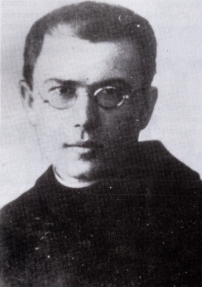
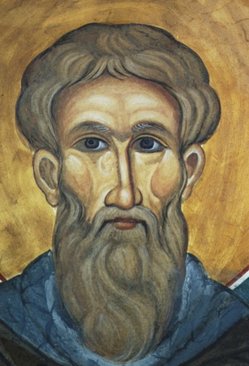
The Byzantine Church celebrates the liturgical memorial of Saint Maximus the Confessor (ca. 580-662) today. He's known for his defense of the orthodox faith against heretical teachings, particularly monothelitism (that Christ had only one will). His significant work in the study of Christ was his work on the Incarnation and the Trinity. Among the other theological interests was his respect for and obedience to the Church of Rome of whom Maximus said held true faith in the Trinity. His defense of the Roman Church set him against those who maintained that the Romans were heretics because they didn't espouse Hellenism.
Champion of Orthodoxy, teacher of purity and of true worship, Enlightener of the universe and adornment of hierarchs: All-wise father Maximus, your teachings have gleamed with light upon all things. Intercede before Christ God to save our souls. Troparion (Tone 8)
Let us the faithful
fittingly praise the lover of the Trinity, The great Maximus who taught the
God-inspired faith, That Christ is to be glorified in His two natures, wills,
and energies; And let us cry to him: "Rejoice, herald of the faith." Kontakion
(Tone 8)
I figured some wisdom from today's saint is worth reading, even though it is not that extraordinary but its simplicity speaks volumes. Saint Jane Frances with Saint Francis de Sales founded the Order of the Visitation of Mary and so this letter of 1616 was written by her to one her spiritual daughters who must have been facing some criticism or some type of hassle from some in the monastery about her prayer life. Mother Jane Frances simply tells her correspondent not reveal all of the details of her prayer life not because she was advocating be obscure but there are times one ought to be discrete. What is a good reminder with Jane's letter is the reminder that we all should pay close attention in keeping the Divine Presence in front of us. So often we are distracted by other things that we fail in keeping God prominently in front of our eyes. Msgr. Giussani reminds us of this necessity and Fr. Carrón hasn't tired in reminding us of this daily witness to Christ.
The second point addressed in the letter provided below by Mother Jane Frances is her correspondent's lack of confidence in her vocation. It could be that the young sister was feeling "dry in her prayer and her vocation," having a lack of confidence that what she is doing is not as she expected. This real isn't it? I can verify that many times I go in life without courage. This is also true was said of Blessed Mother Teresa who for 50 years experienced dryness in her prayer. But her faithfulness to time in prayer showed the depth of her love for Christ. From the opposite point of view, Jane uses Old Testament typology to illustrate how God has been faithful to His people not for one day but for all time. I believe that Divine Providence doesn't give us anything in our life without the grace to "succeed" and everything we experience is given to us by God for our education. I find Saint Jane Frances de Chantal's spiritual advice to be practical and human. Perhaps you might also.

Saint jane Frances writes: "When you are asked what point of prayer you take, and the like, answer boldly as to what you have done or thought formerly in this way: "I have had such thoughts in prayer or done such things while walking about, or when in bed"; but do not say: "Today, or at such an hour, I have done such a thing." It is not necessary to be so explicit, but simply say, "I have done or seen such a thing," and have no scruple in calling all your good aspirations and thoughts prayer, for they are prayer, and so, for the matter of that, are all our actions when done to please God. It is enough to salute your good Angel morning and evening. Attention to the presence of God and of Our Lady includes all, for the blessed Spirits are engulphed in the abyss of the Divinity, and it is more perfect to walk simply. When a novice says to you, "What are you thinking of?" answer frankly, "I am thinking of God," without saying (if it is not so), I was thinking of the Passion, and the like, for no doubt to mention a particular subject (if we were not thinking of it) would be an untruth. Say simply, "I was thinking of Our Lord," and you might, for example, add, "My God, how happy we should be if we could always have the Holy Passion or the Nativity before our eyes." This gives edification enough. I see nothing else to say.
Oh! but yes; just a word for my Little One. I beg of you, my dearest Sister, not to trouble about what you feel or do not feel, this I say once for all. Serve Our Lord as it pleases Him, and while He keeps you in the desert serve Him there with good courage. He made His dear Israelites spend forty years there, accomplishing a journey that they could have made in forty days. Take courage then, and be satisfied with saying, and being able to say, though without relish, "I wish to live wholly for God and never to offend Him"; and when you stumble, as is sure to happen (be it a hundred times a day), rise up again by an act of confidence. Do likewise towards your neighbor, be content with having the desire to love him, or desiring to desire it, and to procure for him all possible good, and, opportunity given, minister gently to him.
In short take bravely the road in
which God leads you it is a safe one, although you may not have all the light
and satisfaction you would like; but it is quite time to abandon to Our Lord
all these plans and desires, and to walk blindly, as divine Providence wills,
believing that it will lead you aright.
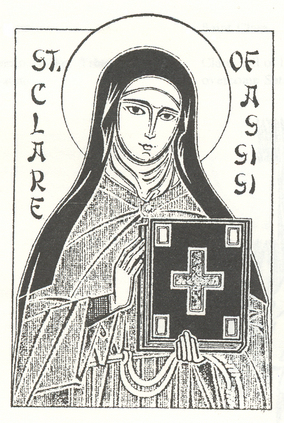 ... for at the altar of the Blessed Virgin Mary, O Father, You mystically espoused Your Son to Your servant Clare, whom Blessed Francis had inspired with the desire of a higher life; You raised her to the summit of seraphic perfection, and chose her to become the mother of a family of virgins ... (Franciscan Preface, feast of St Clare)
... for at the altar of the Blessed Virgin Mary, O Father, You mystically espoused Your Son to Your servant Clare, whom Blessed Francis had inspired with the desire of a higher life; You raised her to the summit of seraphic perfection, and chose her to become the mother of a family of virgins ... (Franciscan Preface, feast of St Clare)Enticed by Francis' preaching sweet, Christ Crucified became her spouse; She gathered sisters to her side Where poverty would grace their house.
That riches true might be her all;
In poverty, obedience,
And chastity she heard Christ's call.
As mother to her flock, she lived
And modeled Christ to ev'ryone;
In loving service spent herself
In toil from dawn to setting sun.
As she has shown us, Lord, your way,
So give us grace like her to be,
That we may turn from self to you
And in your way be truly free.
Most high, omnipotent, good God,
O Father, Son, and Spirit blest,
With Mother Clare and all your saints
Bring us, your Church, to endless rest.
J. Michael Thompson
Copyright © 2009, World Library Publications
LM; CREATOR ALME SIDERUM, BRESLAU, O WALY WALY
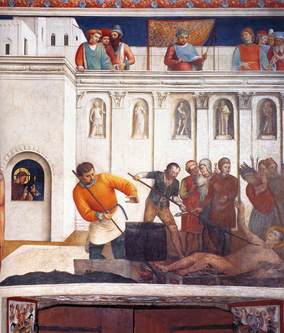 As blessed Lawrence lay on the gridiron, to which the
torturers held him fast with forks over the burning coals of fire, he cried out
to the wicked magistrate: "The roasting is done! turn now the carcass and
devour, for the rest of the substance of the church, which you desired, has
been garnered up into heaven by the hands of the poor! (an antiphon)
As blessed Lawrence lay on the gridiron, to which the
torturers held him fast with forks over the burning coals of fire, he cried out
to the wicked magistrate: "The roasting is done! turn now the carcass and
devour, for the rest of the substance of the church, which you desired, has
been garnered up into heaven by the hands of the poor! (an antiphon)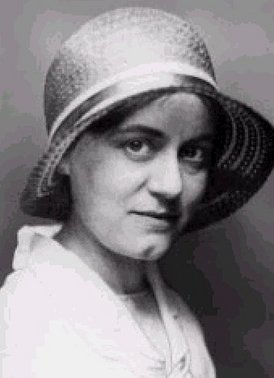
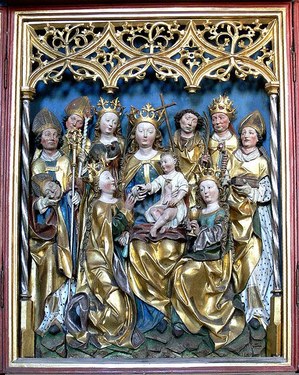 Almighty and merciful God, who didst adorn Thy Saints
George, Blase, Erasmus, Pantaleon, Vitus, Christopher, Denis, Cyriacus, Acacius,
Eustace, Giles, Margaret, Barbara and Catherine with special privileges above
all others, so that all who in their necessities implore their help, according
to the grace of Thy promise, may attain the salutary effect of their pleading,
grant to us, we beseech Thee, forgiveness of our sins, and with their merits
interceding, deliver us from all adversities, and kindly hear our prayers.
Almighty and merciful God, who didst adorn Thy Saints
George, Blase, Erasmus, Pantaleon, Vitus, Christopher, Denis, Cyriacus, Acacius,
Eustace, Giles, Margaret, Barbara and Catherine with special privileges above
all others, so that all who in their necessities implore their help, according
to the grace of Thy promise, may attain the salutary effect of their pleading,
grant to us, we beseech Thee, forgiveness of our sins, and with their merits
interceding, deliver us from all adversities, and kindly hear our prayers.
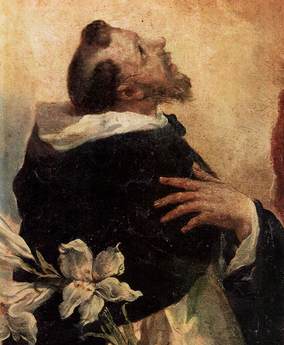
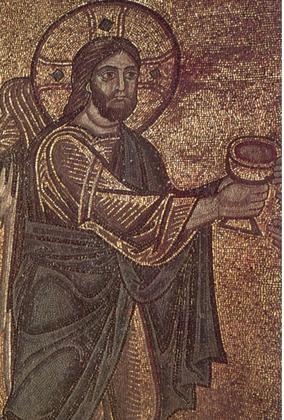 Lord, meditating on our way of proceeding, I have discovered that the ideal of our way of acting is your way of acting.
Lord, meditating on our way of proceeding, I have discovered that the ideal of our way of acting is your way of acting.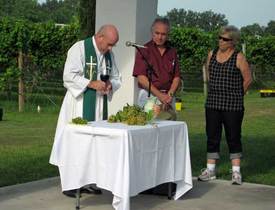
A pious liturgical custom is for the priest to bless grapes on the feast of the Transfiguration of the Lord. Why do we bless grapes on the Transfiguration? Symbolically and on a concrete level grapes represent real transformation, an old vine produces new fruit, a new harvest for God. As the Lord was transfigured on Mount Tabor, so we too are given the grace by God to transform our lives more and more according to His will, the Gospel. The hard of personal conversion is done by authentically following the Church.
Theologically, one might say that the grape is symbolic of new life; think of the fruit derived from grapes, wine, used at Mass. That after the overshadowing of the Holy Spirit and the prayer of consecration the wine becomes the Precious Blood of Christ. It is by His Blood we are saved, given new life, a pledge of future glory with the Blessed Trinity in heaven. Many liturgical families, including the Latin, Byzantine and Armenian Churches have a liturgical theology and rite for the blessing of grapes and situate the blessing of grapes as a needed reminder of our real and on-going conversion to Christ in hearts and minds of Catholics. (Read this blog post on the blessing of grapes where the author brings together several elements: work, harvest, offering, human transformation by God, liturgy, new life, etc.)
Priest: Our help is in the name of the Lord.
Response: Who made heaven and earth.
Priest: Let us pray to the Lord.
Response: Lord, have mercy.
Bless, O Father, this new fruit of the vine, which you permitted to ripen through good weather, and drops of dew and may it bring joy for us who will partake of this fruit of the vine, and forgiveness of sins to those who offer it, through the pure Body and Blood of Your Christ, with whom You are blessed, together with Your all holy, good and life-giving Spirit, now and always and forever and ever.
R.Amen.
(this blessing is taken from the August Menaion, Byzantine Melkite Euchologion published by the Melkite Eparchy of Newton.)
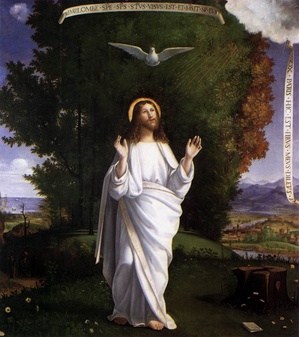
As Daniel, seer of old, had seen
One like a Son of Man,
On whom were kingship, sov'reignty,
And place at God's right hand,
So too, said Peter, we have seen
His glory, come from God,
Revealed to us, who with him lived
And walked in ways he trod.
"This is my Son," the Father said,
"In him is my delight.
To him give ear, that all your ways
May be within my light."
Bring us, O Lord, to hear your Son
That, walking in his ways,
We as your daughters and your sons
May praise you all our days.
J. Michael Thompson
Copyright © 2009, World Library Publications
CM; ST. MAGNUS, ST. STEPHEN, MORNING SONG
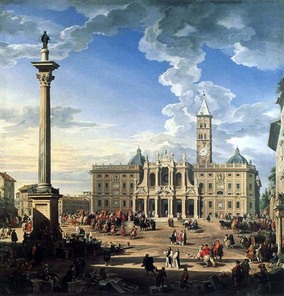 A few times a year the Church's sacred Liturgy observes a liturgical memorial of a church's dedication and today is one of those observances. When you get down to brass tax we don't glorify a building but the action of the Blessed Trinity in the lives of believers.
A few times a year the Church's sacred Liturgy observes a liturgical memorial of a church's dedication and today is one of those observances. When you get down to brass tax we don't glorify a building but the action of the Blessed Trinity in the lives of believers. A CNS story caught my eye this morning regarding the positive impact of membership in Scouts and a priestly/religious vocation. I would agree, membership in Scouts contributed to my own discernment of a priestly vocation. The Scouts certainly takes serious the development of the whole person and works on interpersonal relationships as well as trusting others, BSA builds tomorrow's leaders.
A CNS story caught my eye this morning regarding the positive impact of membership in Scouts and a priestly/religious vocation. I would agree, membership in Scouts contributed to my own discernment of a priestly vocation. The Scouts certainly takes serious the development of the whole person and works on interpersonal relationships as well as trusting others, BSA builds tomorrow's leaders.The liturgical wars of the past years are not over, they're not even close to coming to an end. Too many people have a stake in what will happen with the promulgation of the new Roman Missal in English and then the forthcoming translations of the Divine Office, and sacraments. I look forward to the day when the newly approved psalms get inserted in the daily use of the Church's rites, especially in monasteries where being in conformity with the mind of the Church is not always a value. Ultimately we have to say that the various "insights", agendas, ways of doing things and thinking are in conflict with the whole of the Church's Tradition of continuity. While it is quite fine to be novel in the place where you live and perhaps in the market and work place, no doubt these places rely on new ways of doing things to "spice up life," novelty has no place in liturgical theology, liturgical texts, rubrics, gestures and homilies. What is often missing in the work of liturgical theology and the praxis of the "faith community" is Christ, the true seeking of God's face under the power of the Holy Spirit. How is it that we can claim to be one Church, one faith, working out salvation as proposed be Christ and the Church?
For me, Father Roman Guardini sets the stage of what the truth of the sacred Liturgy is and what its virtue is for the believer.
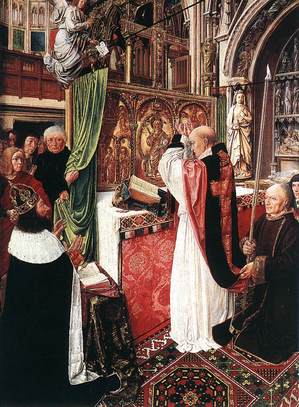 The Church has not built up the Opus Dei for the pleasure of forming beautiful symbols, choice language, and graceful, stately gestures, but she has done it -- in so far as it is not completely devoted to the worship of God -- for the sake of our desperate spiritual need. It is to give expression to the events of the Christian's inner life: the assimilation, through the Holy Ghost, of the life of the creature to the life of God in Christ; the actual and genuine rebirth of the creature into a new existence; the development and nourishment of this life; its stretching forth from God in the Blessed Sacrament and the means of grace, towards God in prayer and sacrifice; and all this in the continual mystic renewal of Christ's life in the course of the ecclesiastical year. The fulfillment of all these processes by the set forms of language, gesture, and instruments, their revelation, teaching, accomplishment and acceptance by the faithful, together constitute the liturgy. We see, then, that it is primarily concerned with reality, with the approach of a real creature to a real God, and with the profoundly real and serious matter of redemption. There is here no question of creating beauty, but of finding salvation for sin-stricken humanity. Here truth is at stake, and the fate of the soul, and real -- yes, ultimately the only real -- life. All this it is which must be revealed, expressed, sought after, found and imparted by every possible means and method; and when this is accomplished, lo! it is turned into beauty.
The Church has not built up the Opus Dei for the pleasure of forming beautiful symbols, choice language, and graceful, stately gestures, but she has done it -- in so far as it is not completely devoted to the worship of God -- for the sake of our desperate spiritual need. It is to give expression to the events of the Christian's inner life: the assimilation, through the Holy Ghost, of the life of the creature to the life of God in Christ; the actual and genuine rebirth of the creature into a new existence; the development and nourishment of this life; its stretching forth from God in the Blessed Sacrament and the means of grace, towards God in prayer and sacrifice; and all this in the continual mystic renewal of Christ's life in the course of the ecclesiastical year. The fulfillment of all these processes by the set forms of language, gesture, and instruments, their revelation, teaching, accomplishment and acceptance by the faithful, together constitute the liturgy. We see, then, that it is primarily concerned with reality, with the approach of a real creature to a real God, and with the profoundly real and serious matter of redemption. There is here no question of creating beauty, but of finding salvation for sin-stricken humanity. Here truth is at stake, and the fate of the soul, and real -- yes, ultimately the only real -- life. All this it is which must be revealed, expressed, sought after, found and imparted by every possible means and method; and when this is accomplished, lo! it is turned into beauty.
This is not a matter for amazement, since the principle here at work is the principle of truth and of mastery over form. The interior element has been expressed clearly and truthfully, the whole superabundance of life has found its utterance, and the fathomless profundities have been plainly mapped out. It is only to be expected that a gleam of the utmost splendor should shine forth at such a manifestation of truth.
For us, however, the liturgy must chiefly be regarded from the standpoint of salvation. We should steadfastly endeavor to convince ourselves of its truth and its importance in our lives. When we recite the prayers and psalms of the liturgy, we are to praise God, nothing more. When we assist at Holy Mass, we must know that we are close to the fount of all grace. When we are present at an ordination, the significance of the proceedings must lie for us in the fact that the grace of God has taken possession of a fragment of human life. We are not concerned here with the question of powerfully symbolic gestures, as if we were in a spiritual theater, but we have to see that our real souls should approach a little nearer to the real God, for the sake of all our most personal, profoundly serious affairs.
For it is only thus that perception of liturgical beauty will be vouchsafed to us. It is only when we participate in liturgical action with the earnestness begotten of deep personal interest that we become aware why, and in what perfection, this vital essence is revealed. It is only when we premise the truth of the liturgy that our eyes are opened to its beauty.
The degree of perception varies, according to our aesthetic sensitiveness. Perhaps it will merely be a pleasant feeling of which we are not even particularly conscious, of the profound appropriateness of both language and actions for the expression of spiritual realities, a sensation of quiet spontaneity, a consciousness that everything is right and exactly as it should be. Then perhaps an offertory suddenly flashes in upon us, so that it gleams before us like a jewel. Or bit by bit the whole sweep of the Mass is revealed, just as from out the vanishing mist the peaks and summits and slopes of a mountain chain stand out in relief, shining and clear, so that we imagine we are looking at them for the first time. Or it may be that in the midst of prayer the soul will be pervaded by that gentle, blithe gladness which rises into sheer rapture. Or else the book will sink from our hands, while, penetrated with awe, we taste the meaning of utter and blissful tranquility, conscious that the final and eternal verities which satisfy all longing have here found their perfect expression. But these moments are fleeting, and we must be content to accept them as they come or are sent. On the whole, however, and as far as everyday life is concerned, this precept holds good, "Seek first the kingdom of God and His justice, and all else shall be added to you" -- all else, even the glorious experience of beauty.
Father Romano Guardini, The Spirit of the Liturgy (New York: Crossroad Publishing, 1998, p 83ff, reprint of 1930 Sheed & Ward edition, trans., Ada Lane).
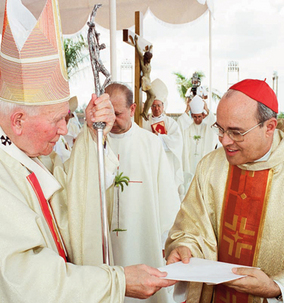
Introducing the 2010 Gaudium et Spes recipient tonight the Supreme Chaplain, Bishop William Lori, quoted the opening words of the Vatican II document by the same name reminding us that: "The joys and the hopes, the griefs and the anxieties of the men of this age, especially those who are poor or in any way afflicted, these are the joys and hopes, the griefs and anxieties of the followers of Christ" (Gaudium et spes, 1).
Lori continued by saying that faith is more cherished when challenged which has been particularly true for the people of Cuba and certainly for the honoree tonight, Jaime Lucas Cardinal Ortega y Alamino, 73, Archbishop of San Cristobal de la Habana.
Steadfast in his witness to Jesus
Christ with apostolic zeal and courage, Cardinal Jaime Ortega was ordained priest in 1964 (he celebrated his 46th anniversary on August 2); he's been a bishop for 31 years
and a cardinal for 15. In 1998, Cardinal Ortega welcomed Pope John Paul II to
Cuba which paved the way for warmer relations between the Church, Cuba and the
world. Himself imprisoned for his Catholic faith he's been an outspoken
advocate for the oppressed and poor. In November, Cardinal Ortega will open new
the San Carlos y San Ambrosio National Seminary to train men for the priesthood
in Cuba. Jaime Lucas Cardinal Ortega y Alamino is the 8th recipient of the
Knights of Columbus Gaudium et Spes Award.
This award was established by the Knights in 1992 to recognize those people who made outstanding contributions to both the Church and to society. The award is a gold medal with an honorarium of $100,000. The intellectual and spiritual orientation of this award is based on the belief that Christians and all people of good will ought to be united, that is, to live in solidarity with all of humanity with its joys and trials. The hope of the Church for all of her children to live a life of total self-giving for Christ and our sister and brother. All of life, as the Vatican II Council Fathers exhorted, ought to "be aroused to a lively hope --the gift of the Holy Spirit-- that some day at last they will be caught up in peace and utter happiness in that fatherland radiant with the glory of the Lord" (GS, 93).
The citation is here and Cardinal Ortega's address can be read here.
Past Gaudium et Spes recipients:
- Mother Teresa of Calcutta, 1992
- John Cardinal O'Connor, 1994
- James Cardinal Hickey, 2000
- William Cardinal Baum, 2001
- Patriarch Michel Sabbah, 2002
- Jean Vanier, 2005
- Tarcisio Cardinal Bertone, SDB, 2007

Taking Pope John Paul II's various exhortations throughout his pontificate (and that of the teaching of Pope Benedict) the Knights of Columbus takes seriously the exercising the ministry of charity as part of an overall method in bringing the Kingdom of God. Making Christ known through works of charity, the Knights of Columbus anchor their mission in the words of the Second Vatican Council where the Council Fathers stated:
the laity, by their very vocation, seek the kingdom of God by engaging in temporal affairs and by ordering them according to the plan of God. They live in the world, that is, in each and in all of the secular professions and occupations. They live in the ordinary circumstances of family and social life, from which the very web of their existence is woven. They are called there by God that by exercising their proper function and led by the spirit of the Gospel they may work for the sanctification of the world from within as a leaven. In this way they may make Christ known to others, especially by the testimony of a life resplendent in faith, hope and charity. Therefore, since they are tightly bound up in all types of temporal affairs it is their special task to order and to throw light upon these affairs in such a way that they may come into being and then continually increase according to Christ to the praise of the Creator and the Redeemer" (Lumen gentium, 31).
Some of the ways in 2009 in which the laity cared for the temporal affairs of society through the work of the KofC whose principles are charity, unity and fraternity:
- $151 million in charitable giving
- the promise of giving all Haitian children needing prosthetic limbs as a result of the earthquake, about a 700 to 800 children in need
- 69 million in volunteer hours
- $17 million for youth programs
- Support of Project Rachel initiatives
- $1.6 million coupled with local and state councils to purchase 53 ultrasound machines
- $1.6 million to Pope Benedict for his charitable work
- $4.3 million given through the McGiveny Scholarship support of vocations since 1992
- $887,000 given over 13 years through the Dailey Scholarship
- RSVP gave $2.8 million in 2009 and in 28 years it gave $47 million to seminarians
- various church loan programs
- Villa Maria Guadalupe, a retreat house owned by the Knights and administered by the Sisters of Life in Stamford, CT
- collaboration in purchasing a handicap bus for VA patients without legs in order to get out of the hospital
- various faith-based and evangelization programs in the US, Mexico, Canada and the Philippines
MOST notable are the four Knights who died in the past year in Iraq and Afghanistan, giving their life for the nation.
What unites the KofC is faith Christ and we are our brother's keeper.
Vivat Jesus!
From a life on Saint Francis of Assisi by Saint Bonaventure:
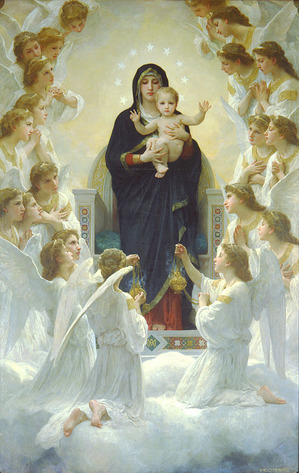
"The Portiuncula was an old church dedicated to the Virgin Mother of God which was abandoned. Francis had great devotion to the Queen of the world and when he saw that the church was deserted, he began to live there constantly in order to repair it. He heard that the Angels often visited it, so that it was called Saint Mary of the Angels, and he decided to stay there permanently out of reverence for the angels and love for the Mother of Christ.
He loved this spot more than any other in the world. It was here he began his religious life in a very small way; it is here he came to a happy end. When he was dying, he commended this spot above all others to the friars, because it was most dear to the Blessed Virgin.
This was the place where Saint Francis founded his Order by divine inspiration and it was divine providence which led him to repair three churches before he founded the Order and began to preach the Gospel.
This meant that he progressed from material things to more spiritual achievements, from lesser to greater, in due order, and it gave a prophetic indication of what he would accomplish later.
As he was living there by the church of Our Lady, Francis prayed to her who had conceived the Word, full of grace and truth, begging her insistently and with tears to become his advocate. Then he was granted the true spirit of the Gospel by the intercession of the Mother of mercy and he brought it to fruition.
He embraced the Mother of Our Lord Jesus with indescribable love because, as he said, it was she who made the Lord of majesty our brother, and through her we found mercy. After Christ, he put all his trust in her and took her as his patroness for himself and his friars."
More on today's feast of Our Lady of the Angels and the Portiuncula Indulgence here. One has to remember that Holy Father Francis received this "little portion" church from the Benedictine monks!
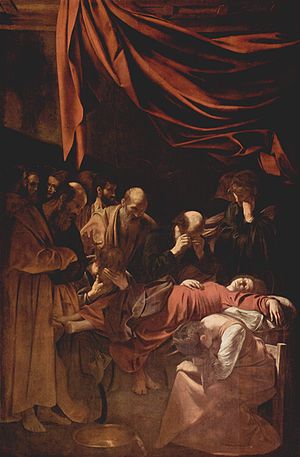 Those Christians who are not Orthodox --as in, Orthodox Christians or Eastern Orthodox or some version of this-- are likely not to be aware that today begins the traditional time of fasting in preparation for the great feast of the of the Assumption (if you are Catholic) or Dormition (if you are Orthodox) of the Blessed Virgin Mary (Theotokos), the all-holy Mother of God. In fact, the Churches of East and West are called upon to prepare for the yearly festival of our Lady by prayer, fasting and almsgiving. Sound familiar? Indeed, the 3-point spiritual discipline is identical with Lent and Advent.
Those Christians who are not Orthodox --as in, Orthodox Christians or Eastern Orthodox or some version of this-- are likely not to be aware that today begins the traditional time of fasting in preparation for the great feast of the of the Assumption (if you are Catholic) or Dormition (if you are Orthodox) of the Blessed Virgin Mary (Theotokos), the all-holy Mother of God. In fact, the Churches of East and West are called upon to prepare for the yearly festival of our Lady by prayer, fasting and almsgiving. Sound familiar? Indeed, the 3-point spiritual discipline is identical with Lent and Advent.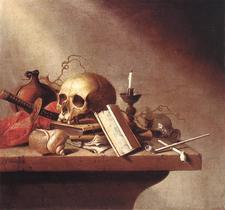 Vanity of vanities! All things are vanity!
Vanity of vanities! All things are vanity!All our striving and our toil are things we leave behind!
Each day and night we strive, we work
And still at the end will die:
If today you shall hear the voice of the Lord,
Then attend God's gracious word!
Greed in all its forms brings death, and things cannot give life.
Fools are we to grow rich for self and not grow rich with God!
"Eat, drink, be merry," calls the world,
And still at the end we die:
If today you shall hear the voice of the Lord,
Then attend God's gracious word!
Raised up now with Christ from death, we set our hearts on high;
Hidden now with Christ is our life, to glory we shall rise!
Fix now our hearts on things above,
Yes, even though we die:
If today you shall hear the voice of the Lord,
Then attend God's gracious word!









